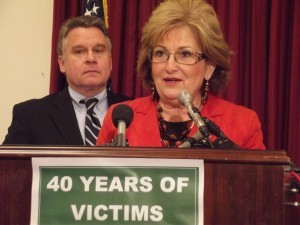
Rep. Diane Black, R-Tenn., speaks at a press conference on the 40th anniversary of Roe v. Wade on Capitol Hill Jan. 22. Rep. Black is co-sponsoring legislation affecting the HHS mandate.
Photo by Catholic News Agency
“We have come together to act to protect Americans’ most basic rights – our rights of conscience and religious freedom,” bill co-sponsor Rep. Jeff Fortenberry (R-Neb.) said March 5.
“The bill simply restores the basic rights in health care that were widely accepted before the implementation of the new health care law.”
The Health Care Conscience Rights Act creates a full exemption from the Department of Health and Human Services mandate requiring most employers with 50 or more employees to cover sterilization, contraception and some abortion-causing drugs.
It also strengthens conscience protections for individuals and health care providers that refuse to provide, pay for or refer for abortion because of their deeply held beliefs.
The legislation’s 50 initial co-sponsors include Rep. Diane Black (R-Tenn.), a former nurse. She charged that the Obama administration is “forcing Americans to make an impossible choice: either defy your religious convictions or break the law and face financially-crippling legal penalties.”
Violators of the HHS mandate could pay fines of $100 per employee per day. While objectors include several Protestant institutions and businesses, the mandate particularly impacts Catholic organizations and Catholic-run businesses because Catholic moral teaching recognizes the mandated drugs and procedures as sinful and rejects cooperation in their provision.
The Obama administration’s proposed compromise only slightly expands the mandate’s narrow religious exemption for non-profit organizations. The mandate’s impact on for-profit companies owned by those with religious objections to the coverage is unaffected by the accommodation.
Several leaders directly affected by the mandate attended a March 5 press conference announcing the legislation, including Sister Jane Marie Klein, O.S.F., board chair of the Indiana-based Franciscan Alliance Inc. The health care system runs 13 hospitals across three states and is a party to one of the over 40 lawsuits challenging the federal rule.
Owners and executives of Hercules Industries, a Colorado HVAC company owned and run by a Catholic family, also attended the press conference.
Marjorie Dannenfelser, President of the Susan B. Anthony List, applauded the proposal.
“The so-called accommodations recently announced to the HHS Mandate do nothing to address the concerns of non-religious entities and employers who do not wish to be complicit in the destruction of life through abortion-inducing drugs,” she said March 5.
She said the legislation would “ensure the conscience rights of all Americans are protected.”
The legislation is not the first effort to undo the HHS mandate. In March 2012, the U.S. Senate voted to table discussion on the Blunt Amendment, which would have allowed health care providers to opt out of providing coverage that violates their religious beliefs or moral convictions.
However, the new legislation also supports individuals like Cathy Cenzon-DeCarlo, a Catholic New York nurse who filed suit against her employer for compelling her to participate in an abortion. She attended the March 5 press conference that unveiled the Health Care Conscience Rights Act.
Rep. John Fleming (R-La.), who is a family physician, said the proposed bill “protects the First Amendment rights of the American health care community” because it allows them to refuse to participate in actions that “violate their deeply held beliefs.”
